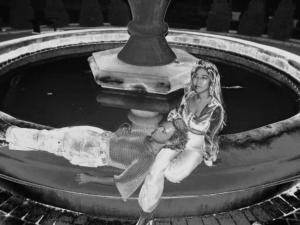Presented as a concept album in three acts, Pleasure Craft’s debut LP Walls, Mirrors, and Windows taps directly into peak-industrial aesthetics to deliver a zeitgeist record that leverages a tightly constructed narrative drawing the listener through a series of conceptual movements on the rise, fall, and redemption of a tragic character battered by the slings and arrows of his own hubris.
Built upon a foundation of breathless industrial rhythms and enhanced by dizzyingly lush production, Walls, Mirrors, and Windows draws considerable influence from Trent Reznor’s turn of the millennium work as Nine Inch Nails, a period that saw the artist rage against the machine of the Bush Administration with a combative and nuanced concept album of his own, and tempered with the masculine/feminine duality of Reznor’s subsequent project with Mariqueen Maandig, Rob Sheridan, and long-time collaborator Atticus Ross, How To Destroy Angels. From these pillars of influence Pleasure Craft are able to construct an imposing House Of Usher furnished with bits and baubles sourced across the breadth of the genre’s high water marks, including the lyrical inventiveness of Gary Numan and the apocalyptic introspection of Alan Vega.
Structurally the record conforms to the traditional plot architecture, moving from exposition through climax to resolution with a comfortable predictability that trims away any hint of narrative excess in favor of a lean, aggressive approach to storytelling. Each act is initiated by brief, delicate segues that carry a similar musical DNA akin to the chiming of lobby bells calling patrons back to their seats after an orchestral intermission. The rising and falling actions are comprised of three tracks each, as is the concluding resolution, neatly constructed and easily digestible. The whole affair is notably theatrical in the “black box” fashion, a blank canvas for an intimate performance supported only by the amorphous ambiguity of light and shadow.
For all its minimalist theatricality, Walls, Mirrors, and Windows doesn’t shy away from blockbuster aspirations; each track is packed to bursting with dense instrumentation and glitchy vocals harmonies that, especially in the first two thirds of the record, pound with unrelenting furiousness. The sheer magnitude of sound would be overwhelming if it wasn’t for the rigid cadence that extends from the overall structure of the album all the way down to the tightly organized arrangements, a disciplined approach keeps the album moving forward with the thrillingly breakneck pace of a glossy midsummer Jerry Bruckheimer production.
Each of the album’s movements are referenced directly in the album’s title, the physical definitions helping to frame up the protagonist’s journey over the course of the 12 tracks. Beginning with “Walls,” the rising action comprises a triptych of unbridled aggression as the protagonist simultaneously erects barriers to keep others away and smashes through others he sees as impeding actualization of his desired endgame. The interplay of defensive and offensive behavior is underscored by absolutely massive percussion and predatory basslines that slink and seduce amidst the jungle of noise. Brooding, slower moments fade in to characterize the ebb and flow of audio adrenaline on “Champion” as Lewis’ declares his intent to “burn ‘til I run out of fuel, then I’ll do what I need to do,” a headlong rush towards absolution born from braided steel determination to remain steadfast in the face of external pressures. But as the walls do their job to keep the outside away those same psychological structures eventually begin to close in as the increasingly claustrophobic “Bag Down” slides dangerously towards oblivion, unravelling into a fleeting moment of disorienting dissonance before abruptly shifting into the swaggering confidence of “Don’t Need A Knife,” a track that finds the protagonist reaching the magnetically powerful apex of militant self-reliance.
From the very top the only way yet to go is down as Walls, Mirrors, and Windows begins its descent into madness. Hovering momentarily above the abyss, “Silver Green” embraces an almost ballad-like euphoria that fleetingly recalls the mature composure of later-career Deftones, lending an atmosphere of unnerving solitude like a late-night solo drive through the country, convertible top retracted with only the stars above, the warm summer air interrupted by the suggestion of an icy chill reaching from the empty back seat. Building slowly, “Dead Weight” materializes into existence like a translucent spectre rising in the rearview before barreling headlong into the punishing instrumentals closer in alignment to the album’s first act but cast with the unspeakable horror of realization that the ghost approaching from behind is already upon you, and the reflection in the mirror reveals the protagonist consumed by the emptiness of his own creation, a shade of a man unable to escape a hell of his own design overcome by deluge of chaos and cacophony. The stillness of “Actor” builds like a static cloud of anxiety infested with electric spiders dancing helter-skelter across webs of razor-sharp glass, eroding the psyche to an tangled mass of loosely twitching nerve endings and self-induced paranoia, a body curled in the fetal position and surrounded by an impenetrable blackness that seethes with whispers from within.
In the final act, when the darkness seems at its most absolute, a window of hope slowly opens as the protagonist awakes alone on the floor, reaching out with initial futility for the help of another but coming away with the realization that through his direct action anyone remote close has been forcibly estranged. “Waking Up” is the realization that the first phase of healing comes from within, and that there is a long journey ahead back to the light. But there is a light, and the opening moments of “Nothing Ever Happens” break like electronic birdsong heralding a brilliant new dawn. “All the little voices lose their edge” as the protagonist is finally able to shut away the devils inside as he looks towards a future defined not by aggression and isolation, but by hope and healing. “Rocki” closes the hero’s journey with the blissful embrace of rest, an ethereal expression of serenity imbued with the same sort of extraterrestrial effervescence as Eric Serra’s compositional work on The Fifth Element, and the arresting vulnerability of Nine Inch Nails’ “Right Where It Belongs” to settle comfortably down into a hard-earned rest.
Walls, Mirrors, and Windows is available now via Bandcamp. Steam the album on Spotify and follow Pleasure Craft on Instagram










